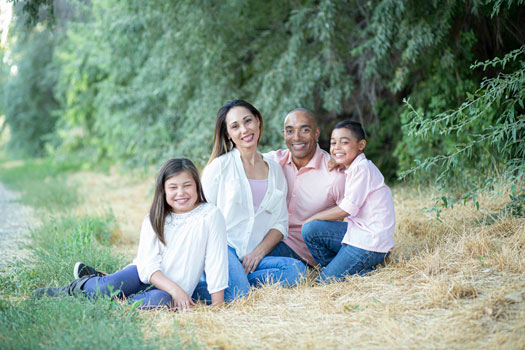Caring for Your Family & Friends
When your child is diagnosed with a disability, chronic condition, or
special health care need, it can be hard to accept and understand, and it can affect
your whole community of family and friends. Family members, such as grandparents,
aunts, uncles, and cousins, may each react differently to a child’s diagnosis, and
friends may also react in different ways. This page is meant to help parents of
children with special health care needs communicate with family and friends about
their child's condition and receive needed support.
Helping Family and Friends Understand
Family and friends are important and play a vital role in many cultures. Often, all you want as a parent of a child with special needs, is for your family and friends to understand your child’s condition and needs, as well as your own need for support. Within your group of family and friends, you may see that some are much more comfortable with your child than others. It’s important to remember that many of your family and friends have not been around someone with a disability before, and they might benefit if you are able to teach and help them to be more understanding and aware.
It is also helpful if you understand that some of your family and friends want to be more involved but do not know what to do or say. You can help break the ice by asking if they want to learn more about your child and offering to teach them. Sometimes, this opportunity to talk to you, ask questions, and understand is all a friend or family member needs.
Receiving Support From Family and Friends
Family and friends offer support in many ways, and often they are the only people parents trust to help take care of their child. When your family and friends offer to learn about and help care for your child it can be such a relief. If they offer, make sure you teach them everything there is to know about caring for your child. Help things to go smoothly, and build your caretakers’ confidence by giving them emergency numbers and information to give health care providers about your child. If your trusted family or friend doesn’t make the offer, don’t take it personally. Everyone has different strengths and can help in different ways. A friend that isn’t comfortable caring for your child while you run errands might be just the person to help out by building a wheelchair ramp or installing a much-needed safety door.
Involve your family and friends in your child's life as much as possible. One mom says, "I love that my son has a favorite uncle, and when he sees him he knows he gets a big bear hug. He also has many cousins his age or younger who are very comfortable around him. In the beginning we taught them about the things that they saw as different, and now things like tracheostomies, feeding tubes and non-verbal communication are normal at family gatherings."
Extended Family Members as Caregivers
Nowadays many grandparents are raising their grandchildren. Often other family members, like aunts, uncles and even older siblings find themselves taking on the role of caregiver for a family member with special needs. Many of the resources for parents of children with special needs will be just as helpful for family caregivers, but like parents, these caregivers may want to connect with someone who knows just what they are going through. There are often local support groups and online support groups for these unique families.
For information and support for family and friends, see links in the Resources section below.
Resources
Information & Support
For Parents and Patients
Family Caregiver Alliance
Here, you'll find information about support groups, education, and advocacy news for family caregivers. A navigator helps
locate state-specific services.
AARP Grandfamilies Guide
The GrandFamilies Guide offers information about finances, health, safety, and support to help you take care of yourself and
your family.
A Grandparent's Guide to Autism
This family support tool kit is designed to help guide and encourage grandparents to establish positive and successful relationships
with their grandchildren and the rest of their families.
AARP Family Caregiver Resource Center
Offers articles and resources to help you navigate your role as a family caregiver.
Services for Patients & Families in Rhode Island (RI)
| Service Categories | # of providers* in: | RI | NW | Other states (3) (show) | | NM | NV | UT |
|---|---|---|---|---|---|---|---|---|
| Family Support Services | 45 | 13 | 23 | 66 | 31 | |||
| Local Support Groups, General | 8 | 2 | 9 | 38 | 63 | |||
For services not listed above, browse our Services categories or search our database.
* number of provider listings may vary by how states categorize services, whether providers are listed by organization or individual, how services are organized in the state, and other factors; Nationwide (NW) providers are generally limited to web-based services, provider locator services, and organizations that serve children from across the nation.
Authors & Reviewers
| Author: | Tina Persels |
| 2013: first version: Tina PerselsA |


 Get Help in Rhode Island
Get Help in Rhode Island